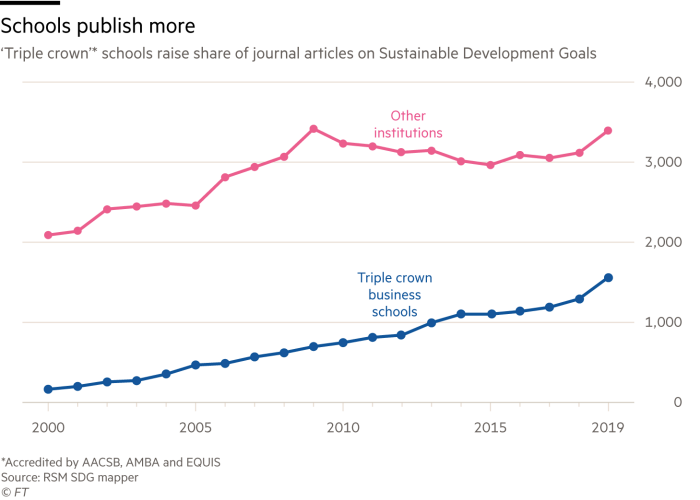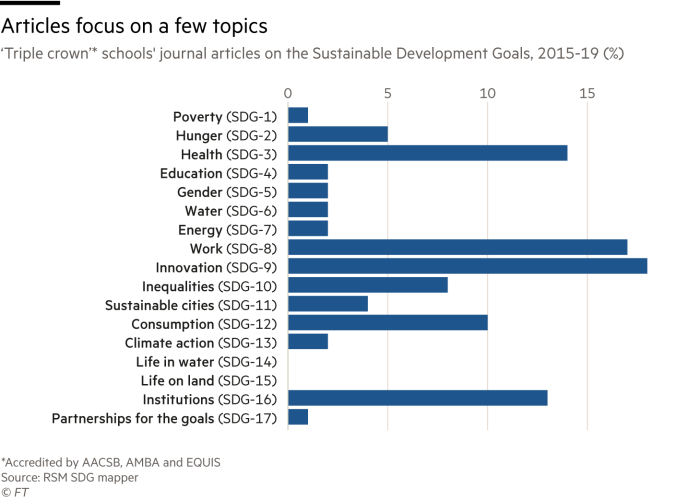Wilfred Mijnhardt has a problem. Europe is home to some of the world’s oldest and most prestigious small business educational facilities, and it has been at the forefront of significantly of the world-wide innovation in educating and exploration on sustainability.
But when he analyses institutions’ functionality centered on their posture in overall rankings, let by yourself their tutorial exploration output, he finds a considerable mismatch with individuals carrying out most to foster liable small business training.
Mijnhardt, plan director at Rotterdam College of Management at Erasmus College, is 1 of a increasing variety of experts checking out ways to better seize this sort of developments. It is also a dilemma on which the FT is reflecting and canvassing views in conjunction with tutorial and sustainability groups. Notably, Mijnhardt has mapped the inbound links amongst the small business schools’ exploration output and the UN’s sustainable progress aims (SDGs).
“Business educational facilities are lagging powering [other disciplines],” he suggests. “They imagine that if they make a number of publications that rely for rankings and accreditation applications, they are carrying out exploration. But this entire world is significantly larger than that and tutorial culture is so significantly a lot more.”
Mijnhardt studied posts on SDGs prepared by small business faculty staff members considering that 2015 that have been published in the FT50 checklist of influential journals. He located that the leading establishments are increasingly centered on the area, with sturdy output in Europe from educational facilities at the universities of Glasgow, Leeds and St Gallen, for instance.
But there are huge gaps, with local climate alter-linked subject areas explored far significantly less in these posts than themes this sort of as poverty reduction and innovation. Some of the posts with the best SDG relevance and impression are published in a lot more obscure and significantly less effectively-regarded journals.
Mijnhardt indicates small business educational facilities have moved a lot more slowly and gradually than other tutorial departments to perform on a lot more interdisciplinary, collaborative and socially suitable themes. Just one motive is they are significantly less reliant on — and accountable to — external exploration funders which are increasingly centered on the priorities of the SDGs. Instead, their exploration tends to be indirectly subsidised by high tuition fees or donations.
Jerry Davis, affiliate dean for small business and impression at Ross College of Business enterprise at the College of Michigan, is a lot more nuanced. “Business educational facilities ironically are 1 of the very last preserves the place you are no cost to observe your thoughts the place it goes, mainly because you are not reliant on federal government or corporate funding,” he suggests. “We have probably a lot more tutorial flexibility to uncover items.”

Schools with the prestigious ‘Triple crown’ of accreditation from the AACSB, AMBA and EQUIS are publishing a lot more posts linked to UN sustainable progress aims in the FT50 checklist of influential tutorial journals applied in small business training rankings
However in exercise, as a founding member of Responsible Research for Business enterprise & Management (RRBM), a community of academics pushing for “credible and valuable research”, he suggests a lot more needs to be finished to reorient his peers’ functions to tasks and publications that present larger societal impression.
Just one critique of present small business faculty rankings, together with the FT’s, is that their calculations do not concentration so significantly on these subject areas. Instead, they draw on info points this sort of as salaries that do not replicate — and may even probably undermine — increasing need by learners, school and companies for a larger emphasis on this sort of social reason, together with in their tutorial output.
But there is a a lot more basic problem for individuals keen to convey about alter: the deficiency of consensus on ways to meaningfully evaluate this sort of functions. Other assessments centered on the SDGs rely heavily on subjective, qualitative judgments by learners and school. They are limited by reference to their own ordeals and establishments, without an external benchmark.

Business enterprise faculty academics are inclined to concentration heavily on unique SDGs, most notably wellness, innovation, perform, usage and establishments, whilst subjects this sort of as the world, poverty, training and gender get fairly small notice
It is specifically challenging to examine the impression of “environmental, social and governance” things in classroom educating or alumni careers. Even in tutorial exploration, extended scrutinised as a result of “bibliometrics” checking out the info all around published exploration, there is small agreement on which measures to use.
Focusing on the material of posts that refer to the SDGs provides a proxy on the extent of action all around these troubles. But it gives only a crude yardstick for the originality, price or applicability of the underlying exploration.
Specialists this sort of as Amanda Goodall, affiliate professor at The Business enterprise College, Town, College of London (formerly Cass), advocate growing the range of publications that are taken into account beyond individuals in the widely recognised and prestigious FT50, to involve a lot more interdisciplinary and expert journals. That would make it possible for for a wider wide variety of themes but could also dilute the perceived tutorial excellent.
Utilizing citations by other academics of posts would aid counter criticism by introducing a peer evaluation of the excellent of any publication. But it does not give an indicator of the impression beyond university walls: the extent to which exploration is go through, shared and carried out by organizations, governments and other organisations. References to posts on social media supply some external validation of interest but also a high diploma of “noise”. A better technique could be get into account references to tutorial exploration in the media, expert weblogs and plan papers.
These are some of the troubles on which the FT, RRBM, the UN’s Concepts of Responsible Management community and other folks, together with the Globally Responsible Leadership Initiative of small business educational facilities, are looking for views.
In spite of the problems, Prof Davis is optimistic about academia’s capability to create substitute measurements, in component mainly because of fresh interest in societal impression within just training and beyond. “Millennials have a quite sturdy sense of social justice and the effect of the perform they do. I’m extremely enthused by the coming generations,” he suggests.
Remember to share your views on how to better evaluate tutorial exploration at ft.com/ft50










More Stories
How To Make Email Marketing Work for Your Small Business or Non-Profit
Increase Analytics Influence: Leverage Predictive Metrics!
Real Thought Leadership is Rare, but Worth the Effort